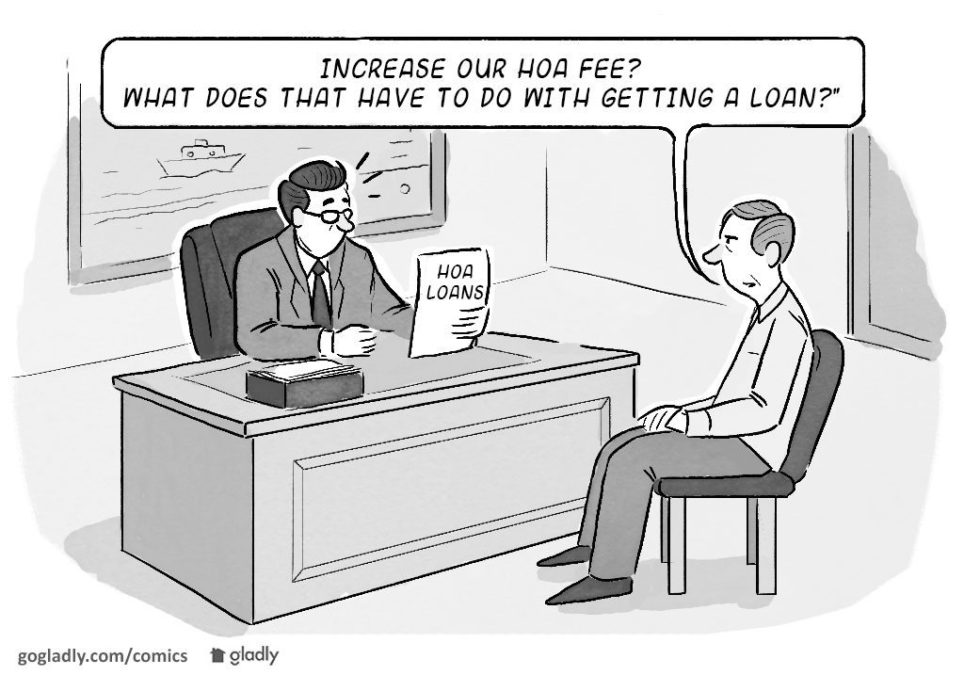Summer is the time for large maintenance and landscape projects and that means spending the big bucks. Too often, HOA discover that they don’t have the money to cover these large expenses. This usually leaves the association with the choice to either impose a special assessment or a HOA loan. So what one do you choose?
A survey found that nearly 62% of American households have less than $1000 in savings or no savings at all. Numbers like this make it difficult for special assessment to be successful and make the HOA loan option a bit more attractive. But what are you really getting into with an HOA loan?
Debt — an American Tradition
Most of us have a loan on our home, car or education. Let’s face it without a mortgage; many of us would not have the opportunity to buy a home. But many Americans borrow too much. The average American household with a credit card carries $6,849 in credit card debt alone.
Here’s the bad news; we human aren’t always responsible when it comes to debt. We borrow too much for things we don’t need — simply because we want it now. Board members must take careful consideration before taking on debt for their HOA.
A Symptom of a Bigger Problem
I hate to state the obvious but if your association is considering a loan the problem is bigger than a dilapidated roof or cracking asphalt. By the time most HOAs consider this option they’ve already figured out that they haven’t saved enough in reserves, or their insurance is insufficient.
Let’s face it, no HOA plans to take out a loan in 15 years to replace the siding on their buildings. For homeowners associations a loan is the solution for failure to plan and save. A loan for your HOA should be a bridge to cross a chasm to a better healthier association.
A Bridge to a Healthier HOA
But here you are with your failing infrastructure and you need some help. Well if you’re going to get a loan for your HOA, here are some important things to consider.
- The HOA loan is not a solution to avoid a necessary dues increase. In fact, now that you have a loan your dues need to cover operations, reserved, and the new loan payment. Yes your dues are going to be higher than the HOA next door with the bigger pool and better landscaping — but that is the price you pay for having dues too low for too long.
- There may be side effects for homeowners. HOA debt can make it difficult for homes within the HOA to qualify for some mortgage or refinance options. This can make it harder to sell your home and may hurt the value of homes in your community.
- Spend wisely. One of the greatest concerns that homeowner have about the HOA loan is that the funds will be spent for unnecessary items or that the HOA will overpay. Assign a committee to help determine where the loan will be spent, get competitive bids and put it all in writing so future board members have the documentation.
- Work with a qualified bank that specializes in community associations. A good banker will help you understand the risks and make a plan so that the loan can be a bridge to a healthier HOA and not a bridge to nowhere.
A loan for your HOA is never ideal, but if you do it, make sure you’re going in with your eyes wide open, educate the homeowners on the risks and potential consequences, and take the necessary steps to get financially healthy so you never have to do it again.
- Liar, Liar, Pants on Fire! Handling Misinformation in Your HOA - March 13, 2019
- Setting the Ground Rules for Neighbor Disputes - June 27, 2018
- HOA Board Responsibilities – It’s Not as Difficult as You’re Making It. - April 23, 2018



 Help
Help
Couldn’t agree more more. This is a helpful article that I plan to share with my clients who are considering a loan. In my experience, an HOA is effective in borrowing only when they also increase dues or cut spending.
Wow. A voice speaking the truth of the matter. Very refreshing. There is a price to pay for having homeowner assessments too low, for too long.
Great article Burke! I shared it on Facebook with fellow professionals of the Community Associations’ Institute-Georgia Chapter.
Thanks Arletha! I’m glad you found the article helpful.
As a HOA Lender, I agree with your assessment. I always take future projects and needs into account when underwriting and set a reserve contribution requirement with every loan. The goal with my HOA Loans is never to leave the HOA needing another loan once they’re done with their current project. Having adequate reserve contributions written into the conditions of their loan agreement helps them to save properly for the future and sets them up to be a better HOA after the loan is done. While it may not be “good for business” (since I hope there are no repeat loan applications), I feel a lot better setting Associations up to succeed. HOA Loans are often a last resort, but I believe that there are times when a good bank can make a large and lasting difference to the future health of the HOA.
Thanks Kristen, I know there are many lenders out there like you who are doing a great job getting HOAs on the right track. Too often it takes the necessity of a loan or special assessment for the HOA to wake up. As for business, in my experience, there are more than enough HOA who are on track for an HOA loan 😉
Keep up the good work!